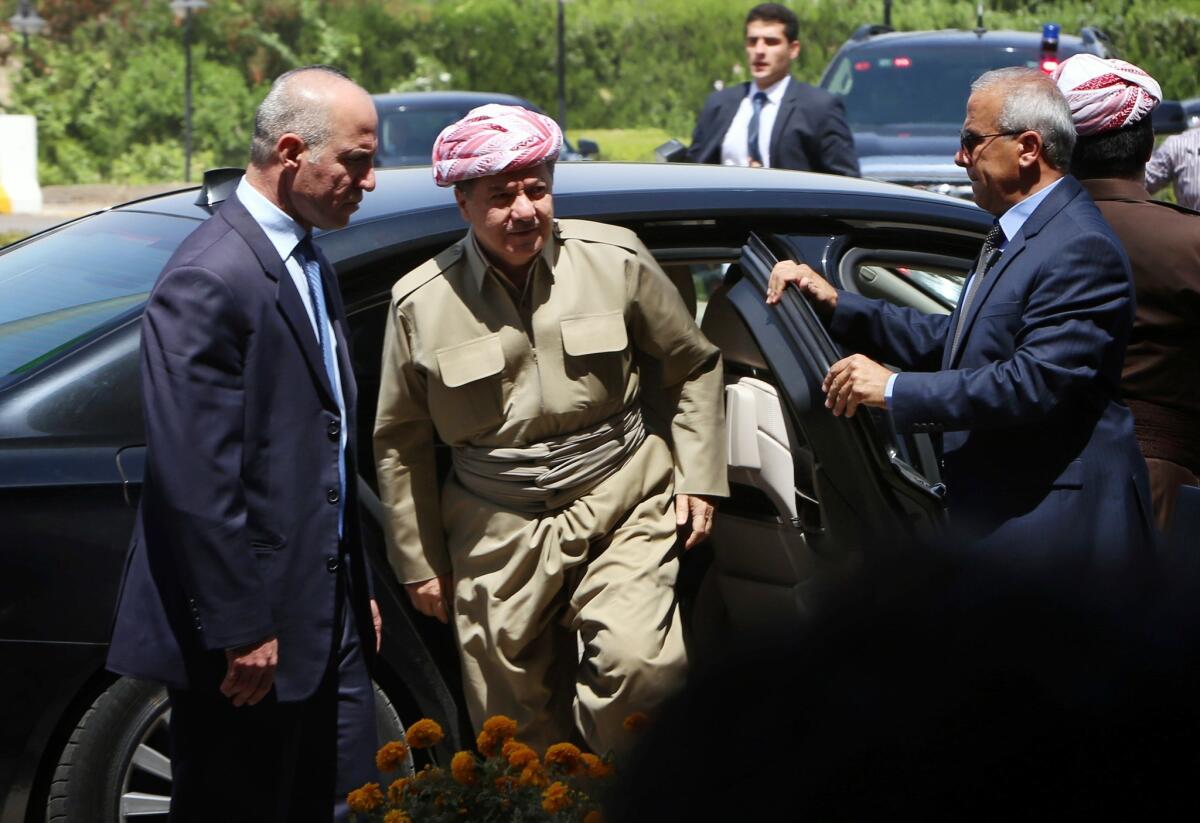Kurdish officials lash out at ‘hysterical’ Iraqi premier Maliki

- Share via
Reporting from Baghdad — Officials in Iraq’s semiautonomous Kurdish region lashed out Thursday at a “hysterical” Prime Minister Nouri Maliki, calling for him to resign as Iraq’s shaky governing structure seemed to plunge further into political disarray.
The escalating war of words between the central administration in Baghdad and the Kurdish leadership in the north would appear to diminish prospects of a unified response to a Sunni Muslim-led insurgency that has seen large swaths of Iraq fall out of government control.
As both sides ratcheted up the rhetoric, long-simmering tensions between Kurds and Baghdad seemed headed for a showdown. On Thursday, the office of Massoud Barzani, president of Iraq’s Kurdistan region, issued a statement in which he charged that the two-term prime minister “has become hysterical and has lost his balance.”
“He is doing everything he can to justify his failures and put the blame on others for these failures,” read the statement, which demanded that Maliki seek contrition and leave office.
Addressing the prime minister directly, the declaration continued: “You must apologize to the Iraqi people and step down. You have destroyed the country and someone who has destroyed the country cannot save the country from crises.”
Meantime, the Kurdish political bloc in Baghdad announced that it would boycott Cabinet meetings. That move would appear to exacerbate the nation’s political paralysis. The harsh words from the Kurdish leadership came a day after Maliki delivered a polemical broadside in his weekly address, accusing the Kurds of allowing their capital, Irbil, to become a “headquarters” for “terrorists” bent on destroying the Iraqi state.
He was referring to an Al Qaeda breakaway group, the Islamic State, which has allied with Sunni Muslim separatists in a military offensive that has seen much of northern and central Iraq fall into insurgent hands. Baghdad, the capital, remains under government control, as does southern Iraq, source of most of the nation’s oil exports.
Maliki is part of the political bloc representing Shiite Muslims, Iraq’s majority population, concentrated in Baghdad and the south.
The Kurdish zone in the north has remained under the aegis of the Kurdish government and its military forces, known as the peshmerga. But much of Kurdish-controlled territory now shares a border with terrain occupied by Sunni Arab rebels.
In their response to Maliki, Kurdish officials rejected the allegation that their region hosted terrorists and said that Kurdistan had always “served as a refuge for oppressed people,” including Maliki himself. Maliki lived in exile, mostly in Iran and Syria but with forays into Kurdistan, for more than two decades during the rule of Saddam Hussein, the late former strongman ousted in a U.S.-backed invasion in 2003.
The Iraqi prime minister has also accused the Kurdish leadership of using the crisis to grab territory—including the oil-rich region near the city of Kirkuk--and to bolster the Kurds’ bid to split from Iraq.
Last week, Barzani asked Kurdish lawmakers to proceed with preparations for a referendum on Kurdish independence, enraging Maliki. Whether the Kurdish independence drive will move forward remains unclear.
Outside powers, including the United States, Iran and Turkey, are generally cool to the idea of a Kurdish state and have stressed the importance of Iraq remaining intact.
Following elections in April, Iraq’s major political groupings—Shiites, Sunnis and Kurds—have failed to agree on the nation’s leadership. Maliki, the most prominent member of the dominant Shiite bloc, has resisted efforts from critics to refrain from seeking a third term.
Detractors have accused Maliki of marginalizing Iraq’s Kurdish and Sunni Arab minorities. His supporters say he remains the top vote-getter and that switching the prime minister during a national security crisis would be a sign of weakness to forces threatening the Iraqi state.
Bulos is a special correspondent.
Follow @mcdneville on Twitter for the latest news from Iraq and Syria
More to Read
Sign up for Essential California
The most important California stories and recommendations in your inbox every morning.
You may occasionally receive promotional content from the Los Angeles Times.













